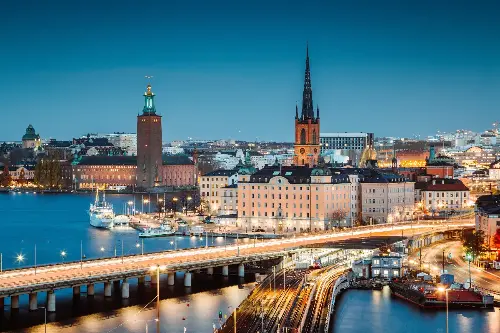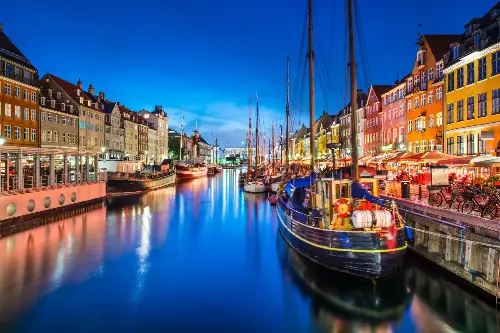In a world where digital connectivity is as vital as electricity, discussions about internet speeds take on a significance that transcends mere technical jargon. The fabric of modern society is interwoven with the threads of high-speed internet, enabling everything from global business communications to the streaming of high-definition content. Yet, while many countries grapple with digital infrastructure, some have soared ahead, offering their citizens internet speeds that would seem almost mythic to others. Let's take a virtual journey to explore the secrets behind the top five countries with unrivalled internet speeds.
South Korea: The Pioneering Pace-setter

No conversation about internet speeds can begin without tipping the hat to South Korea. This East Asian powerhouse has consistently topped global internet speed rankings, and for good reasons. The country's pioneering approach to digital infrastructure, anchored in a government-led initiative dating back to the 1990s, laid the groundwork for today's blistering speeds. South Korea's enviable position is further bolstered by its compact geography and urban density, making the deployment of fibre-optic networks both cost-effective and expedient.
Singapore: Strategically Speedy

Singapore is a model of efficiency, and its approach to internet speeds is no different. Strategic planning by the city-state's government has placed it firmly in the second spot. Singapore benefits from a comprehensive rollout of fibre-optic networks and a competitive marketplace that encourages innovation among internet service providers. The integration of smart technology into the urban landscape has further fuelled the demand for, and delivery of, lightning-fast internet speeds to both businesses and households.
Sweden: Nordic Digital Excellence

Bold government policy and an appetite for technological innovation have also projected Sweden onto the superhighway of high-speed internet. The early adoption of broadband coupled with substantial investments to connect rural areas has paid off in spades. Initiatives like 'The Broadband Goal' aimed at providing all Swedes access to high-speed internet are exemplary of a nation committed to digital inclusion and speed. As a result, Sweden enjoys one of the most robust digital economies in the world.
Denmark: The Continental Connector

Denmark's secret lies in having one of the most reliable and widespread broadband networks in the world. With a considerable portion of the populace living in urban areas, Denmark has leveraged its geography to optimise network deployment. The Danish government’s commitment to digitalisation has unfolded a myriad of public-private partnerships, propelling the nation into the upper echelons of internet speed rankings. Industrial foresight and societal commitment to digital literacy have solidified Denmark's position as a global internet leader.
Norway: The High-Speed Fjord Frontiersman

Rounding up the top five is Norway, with its focus on future-proofing its digital infrastructure. Impressively, Norway has overcome the challenges posed by its rugged terrain to ensure high-speed internet even in the remotest of fjords. This is a testament to the importance the Norwegian government places on digital connectivity as a driver for economic and social wellbeing. Enhanced by their commitment to research and innovation in information technology, Norway delivers world-class internet speeds that are hard to match.
The Secrets Behind the Speed
What common threads unite these countries in their successful pursuit of unmatched internet speeds? There appears to be a mix of factors that interplay to create the perfect digital storm: foresighted government policies, heavy investment in advanced infrastructure, competition among ISPs, and a cultural emphasis on the importance of connectivity.
One cannot overlook the role of government in promoting a digital-forward agenda. Heavy investments and strategic policies to encourage broadband development have been crucial. But government efforts would fall short without competition among internet service providers to drive improvements and reduce costs, leading to more accessible high-speed internet for the masses.
Another factor is societal attitude towards technology. In these countries, embracing technology and understanding its role in economic and social progress has been integral. Digital literacy programs and an emphasis on tech education are widespread, ensuring a ready market for high-speed services and an informed push for continuous improvements.
Looking Ahead
As we gaze into the digital horizon, it’s clear that high-speed internet is more than a convenience; it's a critical infrastructure that underpins innovation, communication, and the very connectivity that binds the globe together. The lessons learnt from the world’s leaders in internet speed suggest a blueprint for other nations to follow: invest, plan, educate, and compete.
These leading nations have set the benchmarks; now it's time for the global community to race ahead together, ensuring everyone has access to the digital fast lane. High-speed internet is no longer a luxury; it is the gateway to knowledge, empowerment, and progress in the 21st century. As we consider these trailblazers, we can only imagine the possibilities that arise from a world where high bandwidth is not the exception but the norm.
